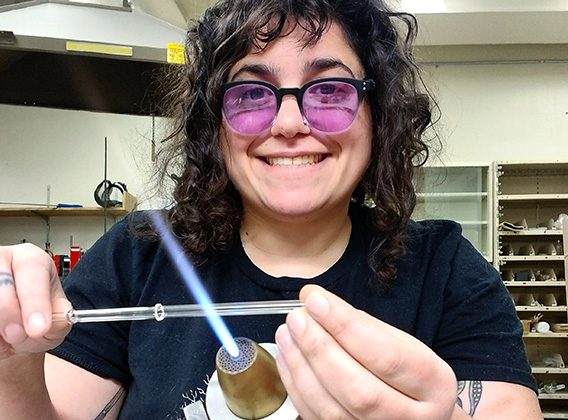GLASS ALUMNI
Corina Guerra
Scientific Glass Technology (A.A.S.)
Alumni Profile: Corina Guerra
April 30, 2021
Before enrolling at Salem Community College, Corina Guerra had done her homework. She discovered that scientific glass technologists are in demand. That fact cemented her decision to choose the Scientific Glass Technology (SGT) program.
“I was surprised at how many job postings there were for scientific glassblowing positions when I could barely find steady employment as a waitress,” said Corina, who earned a BFA in Glass Art in 2011 from Alfred University in New York before enrolling at SCC. “I was also surprised that these positions paid well, offered benefits and included sick and vacation time. They were the ‘big girl’ jobs that I never thought would be obtainable as a glassblower!”
After seeing the employment rate for SGT graduates, Corina applied to Salem Community College instead of pursuing an MFA. “I am so fortunate that I had learned about SCC and scientific glassblowing while I was at Alfred or I would’ve never thought to pursue scientific glassblowing as a viable career path,” she said.
Corina visited SCC’s Glass Education Center in Alloway in the spring of her senior year when the College hosted the Glass Olympics for collegiate glass art students. “I was extremely impressed by the flameworking facilities and the work that was produced by the students there,” she recalled. “It was also the first time I had learned about scientific glassblowing and I was mesmerized by the complexity of the scientific apparatus on display. It made me want to learn how to fabricate such complex items.”
While enrolled at SCC, Corina also took a few artistic flameworking classes with Glass Art Instructor Amy Lemaire. “Even though I was in the SGT program,” said Corina, “Amy inspired me to use my scientific technical abilities and apply them to my art work. She also inspired me to look deeper into my own artistic thought processes and inspirations.”
By the time she earned an Associate in Applied Science degree in Scientific Glass Technology in 2015, Corina had gained all of the foundational skills to enter the scientific glassblowing field at Chemglass Life Sciences in Vineland. She credited her SCC mentors -- longtime scientific glass technologists Dennis Briening and Bob Russell – for helping prepare her.
“I was able to progress to more complex jobs, get raises and promotions much quicker at my production job than those who were hired and trained internally because of my formal education from SCC,” said Corina, who was mentored by Dan Walker at Chemglass. “Working in scientific glass production helped me clean up the techniques that I had already learned.”
After two years at Chemglass, Corina was recruited for a research scientific glassblowing position at 3M in St. Paul, Minnesota in 2017. “I support research and development by designing and fabricating specialized apparatus, modifying and repairing glassware, as well as cutting a variety of different types of plate glass for various testing and experimentation,” she said.
“My education at SCC has also helped me immensely at my current R&D position,” she said. “Because of the SGT curriculum, I am able to understand how and why certain glassware and components are used in certain situations. During my second year at SCC, Bob Russell made us do some critical-thinking exercises where he showed us a piece of apparatus and we had to figure out how it was made, what were the steps we would take to make it and in what order. As a result, I can now de-construct and figure out the assembly of complex apparatus that I have never made before without knowing the exact steps. This has been particularly handy when I have to construct apparatus that are unique and have likely never been produced before.”
Corina is highly involved with American Scientific Glassblowers Society (ASGS). She has been published twice in Fusion, the ASGS quarterly publication, and is currently the Director of the Midwest Section.
Her advice to prospective and current SCC students:
“Take advantage of the years (sometimes decades) of knowledge that the staff and faculty have. Ask questions, ask for help, ask for insight. Trust your teachers! And connect with them, because you never know when down the road you might need a reference or need to reach out for guidance.”
“Make connections with your peers. I still talk to a bunch of people I met at SCC, including some of my professors. These are valuable resources that I can still reach out to for help to this day. What is nice about the friends I made while I was at SCC is that everyone went their own separate paths. Everyone has gained some substantial knowledge in different fields than what I learned. I reach out to my SCC friends for advice and questions regularly when I come across something that I do not understand or have little experience with.”
“Take full advantage of the wonderful studios you have! Use the open torch time as much as you can to up your skills. Experiment with hot glass! Learn as much as you can in all of the different glass-working techniques because you might not know when your varied glass knowledge can be handy. In my research position I have used kiln-working, cold-working and mold-making knowledge for various projects. An R&D scientific glassblowing position is not just flameworking all the time!”
“If you want to pursue a career in scientific glassblowing, get involved with ASGS. Check out the local meetings, read Fusion and attend symposia (during non-COVID times). You can make connections through this society that will help further and develop your career. This society is filled with a LOT of knowledge.”
Corina described her proudest moment at SCC: “I had posted a picture on social media of one of my assignments from my second year that I was proud of,” she recalled. “As a result, I was offered temporary part-time scientific glassblowing work from someone who I had met through the Del Val ASGS. This person saw how clean my side seals were and hired me to help make some components for a job he was behind on. It worked perfectly with my school and work schedule and I was able to gain valuable knowledge from the few months I worked for this person. I never thought that posting a school assignment on social media would result in employment.”
As a side gig, she teaches flameworking classes at Foci Minnesota Center for Glass Arts in Minneapolis. “Working at Foci has been a wonderful benefit that has allowed me to continue working and developing my technical skills in the hot shop without worrying about making enough product to sell from my blow slots to cover the cost,” she said. “Foci recently moved locations and built a flameworking studio in the new location. I helped them plan and build the studio. I developed the curriculum for the Flameworking 1 class and just finished teaching the first six-week workshop. I have started to develop the Flameworking 2 curriculum, which we hope to offer in the fall. I have also occasionally taught hot glass ‘discovery’ classes. These are the ‘make-your-own’ type of class that lets the student dip their toe into the experience of glassblowing.”
Corina also does a lot of commission work. “Profits from my commissions go right back in the supporting my glassblowing addiction, such as buying new color and tools,” she said.
“I am very fortunate that I not only get to blow glass for living, but that I live in an area that was a wonderful glass center where I can continue to develop my technical skills and continue my glass education through various workshops,” she continued.
Visit Corina on Instagram at @jewqueen_glass.

